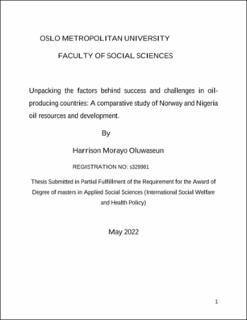| dc.description.abstract | Oil and gas are the important industries in the world energy sector because they play a crucial position in the global market. Elsgård (2014) argued that previous studies show that institutions are an important determinant for the impact of resource inequality and resource curse in the oil dependent countries. In his comparative analysis, transparency, accountability and a strict rule of law are found to be among the features that distinguish successful countries. Meanwhile, despite the efforts of Elsgård's study on oil dependent countries, there are still limited studies exploring the possible factors that determine the success in the use of oil resources. Building from existing studies, the purpose of this thesis is to take a step further to compare the discovery of oil resources in both Nigeria and Norway and establish the factors that explain the difference in the way they manage resource revenue for the development of their respective countries.
Within this context, the critical main research question answered in this thesis is: 1) What are the social, economic and political factors influencing the oil revenue management and development in two oil-producing countries of Nigeria and Norway? To answer this research question, this thesis applied a comparative qualitative approach, employing a scoping review method to search for relevant documents (e.g., articles, and reports) reporting on oil production, management and development in the two countries of Norway and Nigeria. Using this approach, 35 studies were retrieved and analyzed to answer the research question. Based on the resource curse theory as the theoretical framework, the key findings of this study highlighted those strong institutions and political systems influence the nature of development in resource-rich countries. The findings have shown that contrary to the assumptions of the resource curse theory, not all mineral natural resourced countries end up with worse economic situations. The key element is strong institutions as in the case of Norway, which determine the way resources are distributed and managed. The findings in this study have strong implications for resource-rich but less democratic countries. | en_US |
